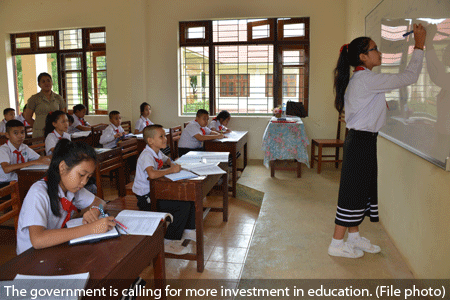Laos: Budget constraints lower investment in education, health
Budget constraints have resulted in lower than appropriate levels of investment in the education and health sectors, the Deputy Minister of Finance has said.
State investment in the two sectors reached just 21 percent of state spending this year – 13.3 percent for education and the remaining 7.7 percent going to the health sector, Dr Atsaphangthong Siphandone told members of the National Assembly (NA) recently.
He made the comments during a recent meeting in Vientiane in response to inquiries raised by members of parliament.
Assembly members complained that the 13.3 percent for education was too low and violated the Law on Education, which stipulates a minimum investment in the sector of 18 percent.
Meanwhile, the 7.7 percent for the health sector was lower than the 9 percent agreed by the Assembly.
“State investment in these two sectors has not achieved the targets as resolved by the NA because of budget difficulties,” he said.
However, the deputy finance minister added that real investment in the two sectors could reach at least 25 percent of total state spending.
He explained that the 21 percent for the two sectors was sourced from the state budget – one of the four sources of finance for these sectors’ development – with the other three being grants, loans, and contributions from society.
In addition, investment in many educational institutions run by different ministries had not been incorporated into the reported 21 percent.
For instance, investment in the Dongkhamxang Financial and Economic Institute run by the Ministry of Finance, and the National Academy of Politics and Administration had not been incorporated, Dr Atsaphangthong said.
“If spending on all educational institutions and from all the four sources is concluded and incorporated, investment in these sectors would reach at least 25 percent,” he said, citing an assessment by foreign experts.
Members of parliament and economists have called for more investment in human resource development, saying it is a key driver for the country’s socio-economic development.
A senior economist from the Faculty of Economics and Business Management at the National University of Laos, Dr Phouphet Kyophilavong, has suggested the government should invest more in education and healthcare to ensure that young people have greater access to quality higher education, vocational skills, and good health.
Doing so would enable the government to maximise the country’s potential of having a larger young workforce to further boost the economy which has enjoyed steadfast growth.
“One of the main challenges is how to ensure the government can produce the human resources and skilled workforce required to meet the country’s development needs,” Dr Phouphet told Vientiane Times recently.
Source: http://www.vientianetimes.org.la/FreeContent/FreeConten_Budget.html


 Thailand
Thailand




